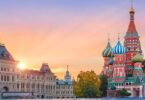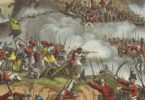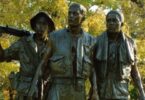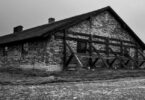European History Trivia Questions and Answers:
Which event sparked the beginning of the Seven Years’ War in Europe?
(a) The French and Indian War in North America
(b) The War of the Austrian Succession
(c) The Partition of Poland
(d) The American Revolution
Which country emerged as the dominant power in Europe following the end of the Seven Years’ War in 1763?
(a) Prussia
(b) Austria
(c) France
(d) United Kingdom
Which European monarch was executed during the French Revolution?
(a) Queen Victoria
(b) King Louis XVI
(c) Tsar Nicholas II
(d) King Henry VIII
Which war led to the partitioning of Poland among neighboring powers in 1772?
(a) The Russo-Turkish War
(b) The War of the Austrian Succession
(c) The Seven Years’ War
(d) The First Partition of Poland
Which famous composer was born in Austria in 1756 and is considered one of the greatest musicians of all time?
(a) Ludwig van Beethoven
(b) Wolfgang Amadeus Mozart
(c) Johann Sebastian Bach
(d) Franz Schubert
Related: US Civil War History Quiz
Which conflict was fought between 1618 and 1648 and resulted in the deaths of millions of people?
(a) Thirty Years’ War
(b) Hundred Years’ War
(c) Seven Years’ War
(d) War of the Roses
During the 16th century Christian priests together with Spanish soldiers and adventurers destroyed almost all of the written “paper” records of what civilisation?
(a) Mayan
(b) Spanish Muslim
(c) Mozambique Bantu
(d) Tamil
Which French king built the Palace of Versailles in the 17th century?
(a) Louis XIII
(b) Louis XIV
(c) Louis XV
(d) Louis XVI
Which famous play, written by William Shakespeare, was first performed in 1606 and tells the story of a Scottish king’s downfall?
(a) Romeo and Juliet
(b) Hamlet
(c) Macbeth
(d) King Lear
Which famous European explorer is credited with discovering America?
(a) Christopher Columbus
(b) Vasco da Gama
(c) Ferdinand Magellan
(d) Marco Polo
Socrates was the wisest man of the ancient world and developed the method of enquiry and instruction, belonged to
(a) France
(b) Athens
(c) Greece
(d) China
Which Italian artist painted the ceiling of the Sistine Chapel in Rome in the early 1500s?
(a) Leonardo da Vinci
(b) Michelangelo
(c) Raphael
(d) Titian
Related: Quiz on British Raj (Imperialism)
Which English monarch was married six times and famously broke away from the Roman Catholic Church in the 1530s?
(a) Henry VII
(b) Henry VIII
(c) Edward VI
(d) Mary I
Which Ottoman sultan conquered Constantinople in 1453 and made it the capital of the Ottoman Empire?
(a) Mehmed II
(b) Suleiman the Magnificent
(c) Selim I
(d) Osman I
Which Italian astronomer and physicist was put on trial by the Catholic Church in 1633 for his heliocentric theory of the universe?
(a) Galileo Galilei
(b) Nicolaus Copernicus
(c) Tycho Brahe
(d) Johannes Kepler
Which country experienced a “Springtime of Peoples” in 1848, when several nationalist revolutions took place across the continent?
(a) France
(b) Italy
(c) Germany
(d) Austria
Who led the unification of Italy in the 1860s?
(a) Giuseppe Garibaldi
(b) Otto von Bismarck
(c) Napoleon III
(d) Camillo di Cavour
Related: World War One (1914–1919) Quiz
Which country suffered the most casualties during World War I?
(a) Germany
(b) France
(c) United Kingdom
(d) Russia
Which political ideology emerged in the early 20th century as a reaction to the perceived failures of liberal democracy and capitalism?
(a) Fascism
(b) Socialism
(c) Conservatism
(d) Liberalism
Which Hungarian uprising against Soviet control in 1956 was brutally suppressed by Soviet forces?
(a) Prague Spring
(b) Solidarity Movement
(c) Velvet Revolution
(d) Hungarian Uprising
Which British prime minister, in power from 1979 to 1990, was known for her conservative economic policies and strong stance against trade unions?
(a) Tony Blair
(b) John Major
(c) Margaret Thatcher
(d) Winston Churchill
Who was the famous European philosopher who wrote “I think, therefore I am”?
(a) Rene Descartes
(b) Immanuel Kant
(c) Friedrich Nietzsche
(d) John Locke
Related: Monarchs of England Quiz
Which European country was the first to introduce the metric system of measurement?
(a) France
(b) Germany
(c) Spain
(d) Italy
Which monarch was known as the “Sun King” and ruled France for over 70 years in the late 17th and early 18th centuries?
(a) Louis XIV
(b) Louis XV
(c) Louis XVI
(d) Louis XVII
Which famous European artist is known for his works such as the Mona Lisa and The Last Supper?
(a) Vincent van Gogh
(b) Pablo Picasso
(c) Leonardo da Vinci
(d) Rembrandt van Rijn
Which European country was ruled by the Habsburg dynasty during the 1600s?
(a) France
(b) Spain
(c) Portugal
(d) Austria
Which Italian artist painted the ceiling of the Sistine Chapel in Rome in the early 16th century?
(a) Leonardo da Vinci
(b) Michelangelo
(c) Raphael
(d) Titian
‘The Hundred Years’ War was fought between which two European countries?
(a) France and England
(b) Spain and Portugal
(c) Austria and Hungary
(d) Italy and Germany
Related: Test your knowledge about Sweden
Which German theologian and religious reformer wrote the Ninety-Five Theses in 1517, which sparked the Protestant Reformation?
(a) Martin Luther
(b) John Calvin
(c) Huldrych Zwingli
(d) Thomas Müntzer
Which treaty, signed in 1555, granted religious freedom to Lutherans in the Holy Roman Empire and ended a long-standing conflict between Protestants and Catholics?
(a) The Treaty of Augsburg
(b) The Treaty of Westphalia
(c) The Treaty of Utrecht
(d) The Treaty of Aix-la-Chapelle
Which country was the first to industrialize in the 19th century?
(a) France
(b) Germany
(c) Russia
(d) United Kingdom
Which country’s neutrality during World War I was violated when Germany invaded in 1914?
(a) Belgium
(b) Denmark
(c) Switzerland
(d) Netherlands
Which treaty ended World War I in 1919?
(a) The Treaty of Versailles
(b) The Treaty of Trianon
(c) The Treaty of Saint-Germain-en-Laye
(d) The Treaty of Neuilly-sur-Seine
Under the Treaty of Breda (31 July 1667), negotiated to end the Second Anglo-Dutch War, the Dutch kept the colony of Suri-name conquered from the English, and left the English with what area of land?
(a) Australia
(b) Labrador
(c) New Amsterdam
(d) Malaya
Which French general became the first president of the French Fifth Republic in 1958?
(a) Charles de Gaulle
(b) Francois Mitterrand
(c) Jacques Chirac
(d) Nicolas Sarkozy
Related: How much do you know about Spain?
Which European country became the first to join the European Economic Community (EEC) in 1957?
(a) France
(b) Germany
(c) Italy
(d) Belgium
Which event, in November 1989, marked the beginning of the end of communist rule in Europe?
(a) Fall of the Berlin Wall
(b) Velvet Revolution in Czechoslovakia
(c) Dissolution of the Soviet Union
(d) Polish Round Table Talks
Which war, from 1991 to 1995, involved the breakup of Yugoslavia and resulted in the establishment of several independent countries in the Balkans?
(a) Gulf War
(b) Bosnian War
(c) Kosovo War
(d) Chechen War
Which event marked the beginning of World War I in Europe?
(a) The assassination of Archduke Franz Ferdinand of Austria
(b) The signing of the Treaty of Versailles
(c) The fall of the Berlin Wall
(d) The Battle of Stalingrad
Which monarch is associated with the Enlightenment in 18th century Europe?
(a) Louis XV
(b) Catherine the Great
(c) Frederick II
(d) Maria Theresa
Members of which family were, at various times, Kings or Emperors of Germany, Austria, Rome, Hungary, Spain and Bohemia between 1273 and 1918?
(a) Medici
(b) Hapsburg
(c) Saxe-Coburg
(d) Romanoff
Which treaty ended the Thirty Years’ War in 1648?
(a) The Treaty of Westphalia
(b) The Treaty of Utrecht
(c) The Treaty of Aix-la-Chapelle
(d) The Treaty of Ryswick
Related: The Middle East Countries Quiz
Which Dutch painter is considered one of the greatest artists of all time and was active in the 17th century?
(a) Rembrandt van Rijn
(b) Vincent van Gogh
(c) Johannes Vermeer
(d) Frans Hals
Who was the first queen of England to rule in her own right and was known as the “Virgin Queen”?
(a) Mary I
(b) Elizabeth I
(c) Jane Grey
(d) Catherine of Aragon
Which event in 1815 marked the end of the Napoleonic Wars and established a new balance of power in Europe?
(a) The Congress of Vienna
(b) The Battle of Waterloo
(c) The Treaty of Paris
(d) The Revolutions of 1848
Which two countries were the main rivals in the Cold War during the 1950s to 1990s?
(a) France and Germany
(b) Soviet Union and China
(c) United States and Soviet Union
(d) United States and China
Which European country held a referendum in 1973 to join the European Economic Community (EEC), which it later left in 2016?
(a) Greece
(b) United Kingdom
(c) Denmark
(d) Ireland
Which French queen was executed during the French Revolution in 1793?
(a) Marie Antoinette
(b) Catherine the Great
(c) Elizabeth of Russia
(d) Queen Victoria
Related: Can You Name The Currency Of These Countries?
Which famous German wall was built in 1961 to separate East and West Berlin?
(a) Great Wall of Hitler
(b) Hadrian’s Wall
(c) Berlin Wall
(d) Antonine Wall
Which country was formed through a union between Scotland and England in 1707?
(a) United Kingdom
(b) Ireland
(c) France
(d) Spain
What city, founded around 1048 by King Harald III, was largely destroyed by fire and rebuilt from 1624 by King Christian IV and named Christiania, and reverted to its original name in 1925?
(a) Brussels
(b) Oslo
(c) Copenhagen
(d) Bergen
Who was the leader of Nazi Germany during World War II?
(a) Adolf Hitler
(b) Joseph Stalin
(c) Winston Churchill
(d) Franklin D Roosevelt
Which country was the last to abolish slavery in Europe in 1861?
(a) Spain
(b) Portugal
(c) France
(d) Russia
Which French king was known as the Sun King and was the longest-reigning monarch in European history at the time of his death in 1715?
(a) Louis XIII
(b) Louis XIV
(c) Louis XV
(d) Louis XVI
Related: Test your knowledge about South American countries
Which treaty ended the War of the Spanish Succession in 1713?
(a) The Treaty of Utrecht
(b) The Treaty of Paris
(c) The Treaty of Aix-la-Chapelle
(d) The Treaty of Ryswick
Which European country was the first to establish a constitutional monarchy?
(a) Germany
(b) France
(c) Sweden
(d) England
Which country established colonies in the Americas in the 1600s, including Virginia and Massachusetts?
(a) France
(b) Spain
(c) Portugal
(d) England
Which English playwright is considered one of the greatest writers in the English language and wrote works such as Romeo and Juliet and Hamlet in the late 1500s?
(a) William Shakespeare
(b) Christopher Marlowe
(c) Ben Jonson
(d) John Webster






